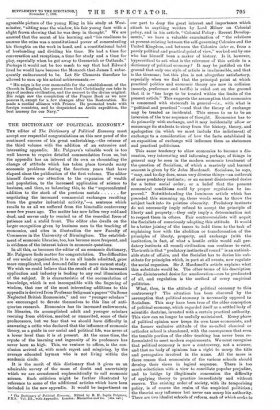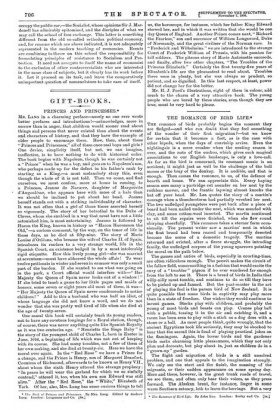THE DICTIONARY OF POLITICAL ECONOMY.* THE editor of The Dictionary
of Political Economy must accept our respectful congratulations on this new proof of the continued success of his great undertaking,—the reissue of the third volume with the addition of an extensive and interesting appendix. Mr. Palgra.ve's valuable work is too well known to require detailed commendation from us, but the appendix has an interest of its own as chronicling the change of attitude which has taken place towards many economic 'problems during the fourteen years that have elapsed since the publication of the first volume. The editor himself draws our attention to the expansion of wealth and population, to the • increased application of science to business, and then, as balancing this, to the "unprecedented
addition to the stock of the precious metals for negotiating the increased commercial exchanges resulting from the greater industrial activity,"—a sentence which recalls to us all we suffered from .the bimetallic controversy some few years ago. The matter has now fallen very cold and dead,.and serves only to remind us of the remedial force of patience and a stolid front. The editor also dwells on the larger recognition given by business men to the teaching of economics, and cites in illustration the new Faculty of Commerce in the UniverSity of Birmingham. The establish- ment' of economic libraries, too, has become more frequent, and is eiidence of the interest taken in economic questions.
In all this, as'becomes the editor of an economic dictionary, Mr. Palgrave fin& matter for congratulation. The difficulties of our social organisation, it is on all hinds admitted, grow more Complicated, and demand fuller and more earnest study. We wish we could believe that the result of all this increased appliCation and industry is leading to any real illumination of the subject. It is characteristic of the accumulation of knowledge, which is not incompatible with the lingering of wisdom, that One of the most interesting additions to this appendix is derived from Professor Seligman's papers" On Some Neglected British Economists," and our "younger scholars " are' encouraged to devote themselves to this line of anti- quarian research. Economics has its increased endowments, its libraries, its accomplished adult and younger scholars rescuing from oblivion, merited or unmerited, some of their predecessors, but we fear that we should have difficulty in answering a critic who declared that the influence of economic theory, as a guide in our social and political life, was never at a lower level than it is at present. At the same time, the repute of the learning and ingenuity of its professors has never been so high. This, we venture to affirm, is the con- clusion arrived at, with much regret and misgiving, by the average educated layman who is not living within the academic circle.
It is the merit of this dictionary that it gives us an admirable survey of the mass of doubt and uncertainty which we are accustomed euphemistically to call economic science. Such criticism might be further illustrated by reference to some of the additional articles which have been included in the new appendix. It would be impertinent- on
" The Dictionary of Political Economy. Edited by R. H. Inglis Palgrave,
P.R.S.' Vol. with Appendix. Loudon : Macmillan and Co. 1:21s. net.)
our part to deny the great interest and importance which attach to anything written by Lord Milner on Colonial policy, and in his article, " Colonial Policy : Recent Develop- ments," we have a valuable examination of " the relations at present existing between the self-governing Colonies and the United Kingdom, and between the Colonies inter as, from a purely political and practical point of view," worked out by one who has himself been a maker of history. Is it, however, hypercritical to ask what is the relevance of this article in a . dictionary of political economy ? It may be justified on the ground that only one style of article is inadmissible, and that is the tiresome ; but this plea is not altogether satisfactory, especially when we find that the principal point at which practical politics and economic theory are now in collision (namely, preference and tariffs) is ruled out on the ground that it is "too large to be treated within the limits of the present article." This suggests the assumption that economics is concerned with statecraft in general—i.e., with what is "political and practical "—and that the theory of exchange
may. be treated as incidental. This seems to us to be an inversion of the true sequence of thought. Economics has to do primarily with exchange, and it may incidentally allow or encourage its students to stray from the history, theory, and apologetics (in which we must include the indictment) of exchange to a consideration of how the facts established in an exposition of exchange will influence them as statesmen and practical politicians.
This same tendency to allow economics to become a dis- cussion, very interesting and informing perhaps, of things in general may be seen in the modern economic treatment of the question of Socialism, of which a masterly and learned ' account is given by Sir John Macdonell. Socialism, he says, • " may, and to-day does, mean very diverse things—an outbreak of mere predatory instincts ; or an earnest disinterested desire for a better social order ; or a belief that the present • economical condition& could by -.proper regulation be im- proved." Notwithstanding the luminous article which has preceded this summing up, these words seem to throw the subject back into its pristine obscurity. Predatory instincts do not necessarily imply refusal to accept the principle of liberty and property,—they only imply a determination not to respect them in others. Fair controversialists will acquit the Socialists of consciously adopting this attitude. It 'would be a better joining of the issues to hold them to the task of explaining how with the abolition or transformation of the principles of liberty, property, and exchange (with the institution, in fact, of what a hostile critic would call pre- datory instincts all round) civilisation can continue to exist. The truth is that "predatory instincts all round" is an unthink- able state of affairs, and the Socialist has to devise his sub- stitute for principles which, in-part at all events, now regulate •
the social organism. Sir J. Macdonell's article explains what this substitute would be. The other terms of his description.
—the disinterested desire for amelioration—can be predicated of all, and regulation is the method of every empirical politician. • What, then, is the attitude of political economy to this controversy P The situation has been obscured by the ' assumption that political economy is necessarily opposed to Socialism. This may have been true of the older conception of political economy, which regarded itself as a settled body of scientific doctrine, invested with a certain practical authority. This view can no longer be usefully maintained. Every phase of political opinion now keeps its own tame economists, and the former exclusive attitude of the so-called classical or orthodox school is abandoned, with the consequence that even the tenable portion of the older teaching has never been re- formulated to meet modern requirements. We must recognise that political economy is now a controversy, not a science.
and that no body of opinions has a right to usurp the title and prerogative involved in the name. All the more is there reason that economists of the various schools should develop their views in logical sequence. There is too much eclecticism with a view to conciliate popular prejudice, and to bridge by illegitimate concession - the difficulty of applying theory to practice immediately and without reserve. The existing order of society, with its temporising policy, is of course the realm of the. empirical politician ;
the theorist may influence but never can usurp his authority. There are two idealist schools of reform. each of which seeks to
occupy the public ear,—the Socialist, whose opinions Sir J. Mac- donell has admirably epitomised, and the disciples of what we may call the school of free exchange. This latter is something different from the old so-called orthodox political economy, and, for reasons which are above indicated, it is not adequately represented in the modern teaching of economics. Events are combining to throw on this school the responsibility for formulating principles of resistance to Socialism and Pro- tection. It need not arrogate to itself the name of economist to the exclusion of other controversialists who are interested in the same class of subjects, but it clearly has its work before it. Let it proceed on its task, and leave the comparatively unimportant question of nomenclature to take care of itself.





























































 Previous page
Previous page